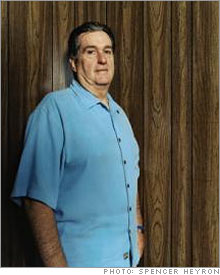Losing the 'auto' in United Auto WorkersThe beleaguered auto workers' union is making a major effort to organize the nation's casino dealers, writes Fortune's David Whitford.(Fortune Magazine) -- "All these yeses - sounds like my bedroom," a union guy whispers in my ear. Yuk-yuk. The setting is a crowded hotel meeting room at the Tropicana Casino & Resort in Atlantic City. It's past midnight on the last Saturday in August. I'm here with dozens of increasingly confident union supporters and several dour company officials as a blue-suited woman from the National Labor Relations Board unfolds ballots one by one and counts the votes: "Yes. Yes. Yes." We've come to witness the results of the latest push by the UAW, a major effort to organize, of all things, the nation's casino dealers. That may seem an odd priority in the middle of the UAW's toughest round of negotiations ever in Detroit, but the beleaguered union knows it needs to recruit new members wherever it can find them.
Final count at the Tropicana: 626 to 157 in favor of the union. Hugs and high-fives all around. Giddy supporters fan out across the casino floor, whooping and shouting, "Dealers win!" and flashing victory signs. It's the fourth Atlantic City dealer win (after Caesars (Charts, Fortune 500), Bally's, and Trump Plaza (Charts)) in six tries since March, good for a total of more than 3,500 members, with several thousand more still up for grabs. Two things we know for sure about the stark drama unfolding simultaneously in Detroit. The current contracts between the UAW and the automakers formerly known as the Big Three will expire Sept. 14, and the new contracts, whenever they are ratified and whatever they contain, will not inspire the joy I witnessed in Atlantic City. In recent years the UAW has negotiated higher and higher pay for fewer and fewer autoworkers, to the point that it has lost significant leverage. The best it can hope for now is to contain the damage to wages and benefits suffered by what was once a blue-collar aristocracy. Here's a chilling set of numbers for anyone who believes in unions: The UAW's membership peaked at around 1.5 million in the 1970s. Since then it's down by nearly one million, in part because of the UAW's failure to organize the so-called transplants - Japanese and German automakers with huge factories in the U.S. Apart from a few thousand workers at special situations in Fremont, Calif. (NUMMI, a small GM-Toyota joint venture), and Normal, Ill. (Mitsubishi, originally a joint venture with Chrysler), the only union autoworkers in the U.S. today work for GM (Charts, Fortune 500), Ford (Charts, Fortune 500), and Chrysler, and their numbers are shrinking: As of the first quarter of 2007, according to the UAW, the total was a mere 180,681. In other words, workers who make autos today constitute a minority within the autoworkers union. Who else does the UAW represent? A fair number of auto-parts makers, including some at Japanese-owned factories, and blue-collar workers in other industries such as defense and aerospace, farm implements, and heavy trucks. But the only net growth these days is happening in the UAW's lesser-known white-collar division, which has added 50,000 new members in the past five years. Among them are draftsmen, engineers, lawyers, teaching assistants, state and municipal employees, nurses, the 2,000 freelance writers who belong (as I once did) to Local 1981, the National Writers Union, and now casino dealers. Until recently dealers, who can make as much as $60,000 a year in wages and tips, didn't think they needed a union. "We had terrific benefits, we had a decent salary," says Suzanne Tomasino, who has been a dealer in Atlantic City for 26 years. "But over the years things have been taken away, and everyone's afraid that our benefits are going to keep being diminished, so I think a union is necessary at this point." The driving issue, not surprisingly, is health insurance. Dealers used to pay nothing for comprehensive coverage. Now some say they pay as much as $175 a week, and that's only if they can work enough hours to qualify as full-time employees. After the vote, everybody drives back to the union hall for the after-party. Plenty of beer and hot dogs, lots of praise for the UAW from its newest members, a feeling that anything is possible. "Our union has never seen itself as just a collective-bargaining agent, but as an agent for social change," UAW secretary-treasurer Elizabeth Bunn told me a couple of days later. "Having numbers in diverse industries only makes us stronger." Maybe so, but the synergy still needs work. Heading back to my hotel as Saturday night turns into Sunday morning, I take inventory of the 10 cars left in the union hall parking lot. Three are Toyotas. |
Sponsors
|


